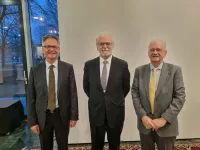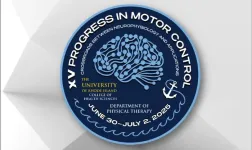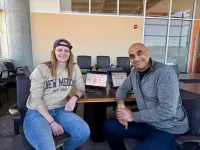(Press-News.org) Relations between Europe and South America – and especially with Brazil - are at a favorable moment, due to factors such as the free trade agreement between Mercosur and the European Union, signed in December 2024 and currently being approved. However, in order to take advantage of this window of opportunity and be competitive, Brazil must continue to expand scientific and technological cooperation with European partners.
This assessment was made by the Brazilian Ambassador to Germany, Roberto Jaguaribe, during the reception for the participants of FAPESP Week Germany, an event held from March 25 to 26 at the Free University of Berlin.
“We’re now experiencing a positive climate in relation to our economic and, more importantly, regional relations, which is related to various factors, such as climate change and the energy transition, as well as others linked to geopolitical movements. This new framework is making it clear that we need to come together in different ways, especially because we have very important convergences,” said Jaguaribe.
“We’re also hopefully in the final phase of a long-negotiated agreement between Mercosur and the European Union, with Germany being the driving force behind its approval. All of this will open new doors, but if we want to be competitive, we need to continue working to develop scientific and technological cooperation, as FAPESP has been doing and which will continue to be fundamental,” he observed.
According to the ambassador, scientific cooperation between Brazil and Germany has played a very important role in the relationship between the two countries, and collaboration with the state of São Paulo in this area has been very strong and deepened in recent years.
“FAPESP is the oldest Brazilian research funding institution and one of the most successful over the years. For this reason, it has developed a very important relationship abroad, including with Germany. We need to encourage the continuation of this valuable effort,” he noted.
According to Marco Antonio Zago, President of FAPESP, Germany is the fourth largest scientific partner of the state of São Paulo, in terms of articles co-authored by researchers associated with universities and research institutions in both regions. The aim of FAPESP Week Germany is to expand and strengthen this scientific and technological cooperation with the European country, he stressed.
“The state of São Paulo has three major partners in scientific collaboration here in Europe, which are Germany, the United Kingdom and France. And, in our opinion, the planning and implementation of cooperation requires face-to-face conversations. Researchers need to get to know their partners and talk to them in order to build relationships of trust and work together,” he said.
“I’m sure that science and technology can bring progress and a peaceful future, and we can do this together. That’s why we’re here,” Zago emphasized.
According to Dietrich Halm, Director of International Cooperation with Latin America at the German Research Foundation (DFG), both the institution and FAPESP, which are partners in organizing the event, are convinced that excellent research is only possible when international cooperation is made possible.
“In view of the new and risky geopolitical movements that are currently taking place, often accompanied by unplanned measures, it’s even more valuable that we have scientific and fact-based exchanges with our partners from Brazil during this event, in order to further strengthen cooperation between São Paulo, Brazil and Germany,” he concluded.
END
Scientific cooperation is strategic for Brazil to strengthen relations with Europe
The state of São Paulo has three major partners in scientific collaboration here in Europe, which are Germany, the United Kingdom and France
2025-03-25
ELSE PRESS RELEASES FROM THIS DATE:
Engineering antibodies with a novel fusion protein
2025-03-25
The Food and Drug Administration has approved more than 100 monoclonal antibodies to treat a range of diseases. Other antibodies are used by physicians to diagnose conditions or by scientists to advance research projects.
Even with significant expansion in the global market for antibodies used in clinical care and research, scientists recognize that there is still untapped potential for finding new antibodies. Many proteins group together in what are called protein complexes to carry out biological functions. The traditional method of generating antibodies by immunizing animals struggles to make antibodies related to these protein complexes.
The conventional ...
Transforming cardiovascular care through upfront combination therapy
2025-03-25
NEW ORLEANS - Ochsner Health Medical Director for Cardiac Rehabilitation and Preventive Cardiology, Carl J. “Chip” Lavie, Jr., MD, recently co-authored a groundbreaking research study featured in the prestigious Mayo Clinic Proceedings highlighting the comparative efficacy of lipid-lowering therapies for reducing cardiovascular risks and led by Maciej Banach, MD,PhD from Poland and leader of the International Lipid Expert Panel ( ILEP). Impact of Lipid-Lowering Combination Therapy With Statins ...
URI to host international XV Progress in Motor Control Conference
2025-03-25
Scientists from around the world specializing in motor control and neuroscience will travel to the University of Rhode Island this summer as the university hosts the international XV Progress in Motor Control Conference.
The university’s Department of Physical Therapy, its George & Anne Ryan Institute for Neuroscience, and the Interdisciplinary Neuroscience Program at URI, will host the biennial meeting of the International Society of Motor Control (ISMC) June 30 to July 2. This year’s conference will be held in the Center for ...
How Zika virus knocks out our immune defenses
2025-03-25
LA JOLLA, CA—Zika virus and dengue virus are very close relatives. Both are mosquito-borne flaviviruses, and both specialize in infecting a host's dendritic cells.
But a new Nature Communications study, led by scientists at La Jolla Institute for Immunology (LJI) and UC San Diego shows that these two viruses have vastly different ways of making us sick.
Zika virus uses stealth. Zika virus slips into dendritic cells and blocks the dendritic cells from alerting nearby T cells to danger. It's the classic horror movie cliche—the creeper is already in the house, and ...
Could an arthritis drug unlock lasting relief from epilepsy and seizures? UW–Madison researchers see promising results in mice
2025-03-25
MADISON — A drug typically prescribed for arthritis halts brain-damaging seizures in mice that have a condition like epilepsy, according to researchers at the University of Wisconsin–Madison.
The drug, called tofacitinib, also restores short-term and working memory lost to epilepsy in the mice and reduces inflammation in the brain caused by the disease. If the drug proves viable for human patients, it would be the first to provide lasting relief from seizures even after they stopped taking it.
“It ticks all the boxes ...
SCAI announces 2025-26 recipients of JSCAI Editorial Fellowship Program
2025-03-25
SCAI Announces 2025-26 Recipients of JSCAI Editorial Fellowship Program
WASHINGTON — The Society for Cardiovascular Angiography & Interventions (SCAI) is pleased to announce the selection of 10 outstanding early-career interventional cardiologists for the 2025-26 JSCAI Editorial Fellowship Program cohort.
The JSCAI Editorial Fellowship Program provides fellows-in-training and early-career interventionalists with a unique opportunity to develop their skills as peer reviewers and gain firsthand experience in the editorial process. Participants are paired with JSCAI Deputy or Associate ...
Study unravels mystery of cancer-fueling enzyme—could lead to new therapies
2025-03-25
For organs to develop, grow and regenerate, cells must proliferate. But when that process goes awry, leading to uncontrolled cell growth, cancer can emerge.
New CU Boulder research, published in the journal Science Advances, offers unprecedented insight into how an enigmatic enzyme, known as CDK7, drives this complex process. The research shows that novel cancer drugs designed to inhibit CDK7 can, within minutes, shut down gene expression pathways that drive cell proliferation in dozens of different ...
Lupus-related antibody shows promise in enhancing cancer treatment efficacy
2025-03-25
New Haven, Conn. — Yale scientists have discovered a promising way to trigger immune responses against certain tumors, using a lupus-related antibody that can slip, undetected, into “cold” tumors and flip on an immune response that has been turned off by cancer. The research, published in Science Signaling on March 25, offers new findings that could help improve therapies for glioblastoma and other aggressive cancers that are difficult to treat.
“It turns out when this antibody gets into the cell’s cytoplasm [the liquid material inside the cell, excluding the nucleus] and it binds ...
BESSY II: Magnetic ‘microflowers’ enhance local magnetic fields
2025-03-25
A flower-shaped structure only a few micrometres in size made of a nickel-iron alloy can concentrate and locally enhance magnetic fields. The size of the effect can be controlled by varying the geometry and number of 'petals'. This magnetic metamaterial developed by Dr Anna Palau's group at the Institut de Ciencia de Materials de Barcelona (ICMAB) in collaboration with her partners of the CHIST-ERA MetaMagIC project, has now been studied at BESSY II in collaboration with Dr Sergio Valencia. Such a device can be used to increase the sensitivity of magnetic sensors, to reduce the energy required for creating local magnetic fields, but also, at ...
New study may help predict cardiometabolic disease risk and personalize prevention strategies
2025-03-25
A new study explores how epigenetic markers—chemical modifications that influence gene activity—can help predict the risk of developing cardiometabolic diseases and guide personalized prevention strategies. The findings are particularly significant as the prevalence of major cardiometabolic risk factors such as hypertension, diabetes, and obesity continues to rise despite advancements in healthcare and treatment. This trend highlights the need for better early detection and intervention.
The study is titled “Poly-epigenetic scores for cardiometabolic risk factors interact with demographic factors and health behaviors in older US Adults” and is published in the journal ...
LAST 30 PRESS RELEASES:
Jeonbuk National University researchers develop an innovative prussian-blue based electrode for effective and efficient cesium removal
Self-organization of cell-sized chiral rotating actin rings driven by a chiral myosin
Report: US history polarizes generations, but has potential to unite
Tiny bubbles, big breakthrough: Cracking cancer’s “fortress”
A biological material that becomes stronger when wet could replace plastics
Glacial feast: Seals caught closer to glaciers had fuller stomachs
Get the picture? High-tech, low-cost lens focuses on global consumer markets
Antimicrobial resistance in foodborne bacteria remains a public health concern in Europe
Safer batteries for storing energy at massive scale
How can you rescue a “kidnapped” robot? A new AI system helps the robot regain its sense of location in dynamic, ever-changing environments
Brainwaves of mothers and children synchronize when playing together – even in an acquired language
A holiday to better recovery
Cal Poly’s fifth Climate Solutions Now conference to take place Feb. 23-27
Mask-wearing during COVID-19 linked to reduced air pollution–triggered heart attack risk in Japan
Achieving cross-coupling reactions of fatty amide reduction radicals via iridium-photorelay catalysis and other strategies
Shorter may be sweeter: Study finds 15-second health ads can curb junk food cravings
Family relationships identified in Stone Age graves on Gotland
Effectiveness of exercise to ease osteoarthritis symptoms likely minimal and transient
Cost of copper must rise double to meet basic copper needs
A gel for wounds that won’t heal
Iron, carbon, and the art of toxic cleanup
Organic soil amendments work together to help sandy soils hold water longer, study finds
Hidden carbon in mangrove soils may play a larger role in climate regulation than previously thought
Weight-loss wonder pills prompt scrutiny of key ingredient
Nonprofit leader Diane Dodge to receive 2026 Penn Nursing Renfield Foundation Award for Global Women’s Health
Maternal smoking during pregnancy may be linked to higher blood pressure in children, NIH study finds
New Lund model aims to shorten the path to life-saving cell and gene therapies
Researchers create ultra-stretchable, liquid-repellent materials via laser ablation
Combining AI with OCT shows potential for detecting lipid-rich plaques in coronary arteries
SeaCast revolutionizes Mediterranean Sea forecasting with AI-powered speed and accuracy
[Press-News.org] Scientific cooperation is strategic for Brazil to strengthen relations with EuropeThe state of São Paulo has three major partners in scientific collaboration here in Europe, which are Germany, the United Kingdom and France






